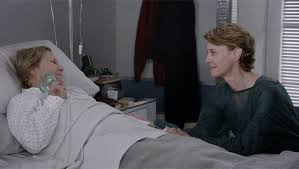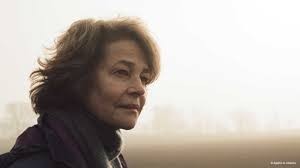MOMMIES DEAREST: Movie Reviews of films Mia Madre and The Light Between Oceans by Howard Casner
Posted: September 11, 2016 | Author: Donald | Filed under: Uncategorized | Tags: Alicia Vikander, Blue Valentine, Bryan Brown, Derek Cianfrance, Francesco Piccolo, John Turturro, Margherita Buy, Mia Madre, Michael Fassbender, Nanni Moretti, Rachel Weisz, The Light Between Oceans, The Place Beyond the Pines, Valia Santelli, We Have a Pope, Wim Wenders, Wings of Desire | 1,757 Comments »For questions: hcasner@aol.com
First, a word from our sponsors: I am now offering a new service: so much emphasis has been given lately to the importance of the opening of your screenplay, I now offer coverage for the first twenty pages at the cost of $20.00. For those who don’t want to have full coverage on their screenplay at this time, but want to know how well their script is working with the opening pages, this is perfect for you. I’ll help you not lose the reader on page one.
Ever wonder what a reader for a contest or agency thinks when he reads your screenplay? Check out my new e-book published on Amazon: Rantings and Ravings of a Screenplay Reader, including my series of essays, What I Learned Reading for Contests This Year, and my film reviews of 2013. Only $2.99. http://ow.ly/xN31r
and check out my Script Consultation Services: http://ow.ly/HPxKE
Warning: SPOILERS
 In many ways, Margherita is having a year of Job.
In many ways, Margherita is having a year of Job.
Her mother is dying and she and her brother spend much of their time with their parent in the hospital. She’s directing a socially conscience film that is not going well; it seems fake and she’s not sure she can make the project work, and small things keep going wrong. She has recently broken up with her latest lover because she can’t leave her work at home. She is having trouble relating to her daughter. And she is having difficulty getting a performance from the American actor flown in for the lead of the film (he has a condition that makes it difficult for him to remember lines, made worse in that they are in Italian).
The film, Mia Madre, is co-written by the director Nanni Moretti (along with Valia Santelli and Francesco Piccolo) and is inspired by the time in his life when his mother was dying while he was filming We Have a Pope. Read the rest of this entry »
THE GOOD, THE NOT SO BAD AND THE UGLY: AFI 2015, Part 4: Married Without Children – 45 Years and Macbeth
Posted: December 8, 2015 | Author: Donald | Filed under: Uncategorized | Tags: 45 Years, Andrew Haigh, Charlotte Rampling, David Constantine, David Thewlis, Justin Kurzel, Macbeth, Marion Cotillard, Michael Fassbender, Paddy Considine, Snowtown, Tom Courtenay, William Shakespeare | 31 Comments »First, a word from our sponsors: I am now offering a new service: so much emphasis has been given lately to the importance of the opening of your screenplay, I now offer coverage for the first twenty pages at the cost of $20.00. For those who don’t want to have full coverage on their screenplay at this time, but want to know how well their script is working with the opening pages, this is perfect for you. I’ll help you not lose the reader on page one.
Ever wonder what a reader for a contest or agency thinks when he reads your screenplay? Check out my new e-book published on Amazon: Rantings and Ravings of a Screenplay Reader, including my series of essays, What I Learned Reading for Contests This Year, and my film reviews of 2013. Only $2.99. http://ow.ly/xN31r
and check out my Script Consultation Services: http://ow.ly/HPxKE
Warning: SPOILERS
 Is this the year of the older, older woman?
Is this the year of the older, older woman?
For some reason, a number of films have been released this year with a central character that is probably not only not in any recognized quadrant of the four that studios so dream of capturing, it’s a target audience many producers probably consider non-existent: a female in her somewhat twilight years.
These include I’ll See You In My Dreams (Blythe Danner as a widow discovering that life isn’t over by any stretch of the imagination); Grandma (Lily Tomlin as a grandmother helping her granddaughter raise money for an abortion); Youth (Jane Fonda as an aging actress desperately trying to hold on to her career); The Woman in the Van (curmudgeon Maggie Smith as…a curmudgeon in a van).
And now we have Charlotte Rampling as Kate Mercer in 45 Years, a heartbreaking and at times emotionally devastating film about a wife who has to reevaluate her more than four decade long marriage in the days leading up to her and her husband’s anniversary.
It’s a roster that perhaps is worthy of an entry in the Guinness Books. Read the rest of this entry »
HEAD CASES: Movie Reviews of Life of Crime and Frank by Howard Casner
Posted: September 7, 2014 | Author: Donald | Filed under: Uncategorized | Tags: Carla Azar, Chris Sievey, Daniel Schechter, Domhnall Gleeson, Elmore Leonard, Francois Civil, Frank, Isla Fisher, Jennifer Anniston, John Hawkes, Jon Ronson, Leonard Abrahamson, Life of Crime, Maggie Gyllenhaal, Mark Boone Junior, Michael Fassbender, Ordell (Yassin Bey, Peter Straughan, Scoot McNairy, Tim Robbins, Will Forte | 8 Comments »First, a word from our sponsors. Ever wonder what a reader for a contest or agency thinks when he reads your screenplay? Check out my new e-book published on Amazon: Rantings and Ravings of a Screenplay Reader, including my series of essays, What I Learned Reading for Contests This Year, and my film reviews of 2013. Only $2.99. http://ow.ly/xN31r
Warning: SPOILERS
 If it is true, as people say, that films influence how we act, then I’m not sure why people are still in the kidnapping biz. I mean, if there is one thing movies have taught us, from Fargo to High and Low to Taken to Misery, that kidnapping thingy just never works out well for those who take to it.
If it is true, as people say, that films influence how we act, then I’m not sure why people are still in the kidnapping biz. I mean, if there is one thing movies have taught us, from Fargo to High and Low to Taken to Misery, that kidnapping thingy just never works out well for those who take to it.
And now we have Life of Crime, written and directed by Daniel Schechter (based on a novel by the immensely popular as well as well respected author Elmore Leonard titled The Switch), the latest variation on the O’Henry short story, The Ransom of Red Chief, in which someone is kidnapped whom the one being extorted the ransom would be just as happy if they were never returned. Read the rest of this entry »
OF GODS AND MONSTERS: Moview Reviews of Godzilla and X-Men: Days of Future Past by Howard Casner
Posted: May 29, 2014 | Author: Donald | Filed under: Uncategorized | Tags: Aaron Taylor-Johnson, Alexander Desplat, Bryan Cranston, Bryan Singer, Dave Callaham, David Strathairn, Elizabeth Olson, Evan Peters, Gareth Edwards, Godzilla, Hugh jackman, Ian McKellen, Jane Goldman, Jennifer Lawrence, Juliette Binoche, Ken Watanabe, Matthew Vaughn, Max Borenstein, Michael Fassbender, Nicholas Hoult, Patrick Stewart, Peter Dinklage, Peter McAvoy, Sally Hawkins, Simon Kinberg, X-Men: Days of Future Past | 1,646 Comments » All the while, while watching Godzilla, the mega monster movie epic written by Max Borenstein from a story by Dave Callaham and directed by Gareth Edwards, all I could think is “where is Mystery Science Theater 3000 when you need them?”
All the while, while watching Godzilla, the mega monster movie epic written by Max Borenstein from a story by Dave Callaham and directed by Gareth Edwards, all I could think is “where is Mystery Science Theater 3000 when you need them?”
(I remember this one moment, see, and this female MOTU, okay, she like passes over the central character, Ford Brody, and you can like see its testicular like sac carrying its eggs and everything, and, and I so wanted Crow, Tom Servo or Gypsy to call out, “Please don’t teabag me, please don’t teabag me”). Read the rest of this entry »
Movie Reviews of 12 YEARS A SLAVE and BASTARDS by Howard Casner
Posted: November 8, 2013 | Author: Donald | Filed under: Uncategorized | Tags: 12 Years a Slave, Bastards, Benedict Cumberbatch, Bryan Bratt, Chiara Mastroianni, Chiwetel Ejiofor, Claire Denis, Hans Zimmer, Jean-Pol Fargeau, John Ridley, Lupito Nyong’o, Michael Fassbender, Paul Dano, Sarah Paulson, Steve McQueen, Vincent Lindon | 15 Comments »John Ridley and Steve McQueen (writer and director respectively, and no I’m not going to make any sort of joke about how great McQueen was riding motorcycles away from Nazis—that sort of thing is so beneath me) have achieved two things in their new film 12 Years a Slave: they have created one of the most beautiful films about slavery that has ever been made, while also creating one of the ugliest and most realistic movies about slavery that has ever been made. I suppose one might say that they even achieved a third thing here: they managed to create a film in which these two seemingly opposing aesthetic approaches actually support and deepen each other. Not an easy feat and the main achievement in this often hard to watch biopic of a free man who is abducted and sold into slavery.
There is much to like here. As was said, it’s both beautiful and horrible to look at. And there is some amazing use of percussion and sound in the thrilling music score by Hans Zimmer. The technical aspects of the film, the set design, the costumes, etc., are first rate. In fact, if someone called this movie brilliant, I’m not sure I could really argue the point. It’s quite an achievement and an experience not easily forgotten.
So why, at the end of the day, was I never quite emotionally involved in this story of Simon Northrop, the free man betrayed and bound into bondage? Why did I find myself getting antsy at times (and not during the scenes of violence and degradation the slaves were put through—those were the last places where I got antsy)? And why, oh, why (and I say this in fear of getting condemned to criticism hell forever), why do I prefer Django Unchained?
I think there are several reasons why 12 Years… didn’t quite work as well for me as it did for many, many others. The first is that it didn’t seem to take movies about slavery anywhere that it hadn’t gone before. Well, true, it’s the most realistic and grotesque depiction of that ignoble institution, and must be given credit for that. But is that enough? In the end, does the movie say anything more than, well, that slavery is bad, just as every other movie about slavery has also so said? It may have proven its thesis more than others, but again, I’m not sure that that alone is quite enough. It’s worthy, very worthy, for that, but is it any more than that?
The structure also felt a bit static as well. There didn’t seem to be any real rises or falls to the story. Instead, in many ways, it was just one horrifying scene after another, all pretty much on the same level of tension, with a plot that didn’t really seem to be heading in any clear direction. Of course, Ridley and McQueen were trapped to some degree by the subject matter. How do you depict twelve years of slavery that revolves around someone who has no choice but to be reactive rather than active and still keep the story going forward in an exciting and riveting manner when there is no real end game within the character’s control?
It’s not easy. Ronald Harwood and Roman Polanski had the same issue but were more successful in their movie The Pianist, also a movie about someone so trapped in a situation he could do little but react. I think, though, that what made the difference there is two things: in the Pianist, we were constantly aware of what that character was doing to survive on a daily basis (whereas for Northrop, this didn’t seem as strongly dramatized; in fact, whenever he did do something to try to fix his situation, it often felt like it was more an afterthought thrown in by the writers rather than something integral to the structure of the story).
The second is that The Pianist had a structure dictated by a time-line series of events: Poland before the invasion, the German enforcement of anti-Semitic laws, the Warsaw ghetto, the central character escaping before he could be taken to a camp, his hiding in Warsaw during the war, and then the war ending and his life in Russia. But in 12 Years…, Ridley and McQueen couldn’t quite find the same sort of structure; Northrop is freed before the Civil War, and there wasn’t much difference in one year from the next, unlike in the Pianist (and when a difference, an interruption in the status quo, could be dramatized, like Northrop’s two years spent with a more “kindly” master, Ridley and McQueen leaped over it as it were insignificant).
I also felt there was something amiss in the characterizations. To be ruthlessly honest, I found it rather odd that the white characters were the most complex and psychologically intriguing here. The personas played by Benedict Cumberbatch, Paul Dano, Michael Fassbender and Sarah Paulson (and even those played by actors like Bryan Bratt in much smaller roles) all seemed to have more depth than the slaves. The main exception to this is perhaps Lupito Nyong’o as the mistress of Fassbender’s slave owner (who plays the part as if her life depended on it; it’s an often terrifying performance), but she has relatively little screen time. In fact, what really surprised me is that in a movie about slavery, so much time was spent on the Strindbergian relationship of Fassbender and Paulson’s characters, a husband and wife who find no end of enjoyment in torturing each other.
And there is that dialog. As far as I can tell, it was well written. That didn’t seem to be the issue. For me (and here in full disclosure I must reveal that my friend who saw the movie with me disagreed most fervently on my assessment), none of the actors ever appeared comfortable with the archaic phrasings and rhythms (it never seemed to roll trippingly off their tongues), unlike, say, the actors in True Grit, who attacked their outdated patois with great gusto, as if to the wild west born, or the actors in Topsy-Turvy, who sounded as if they actually grew up in Victorian London. Everybody recited their lines almost as if they needed at least another week of rehearsal for it to feel natural. And that’s when I found myself getting antsy; when the torture and degradation stopped and I had to actually listen to these people talk to each other for extended periods of time.
Chiwetel Ejiofor plays Northrop with a great deal of empathy. He is a fine actor and is getting all the praise he deserves for his skill here. But in the end, I never quite became emotionally involved in it the way, I’m sure, Ridley and McQueen wanted me to be. I am more than willing to accede that this is all on me. But as much as I appreciated the experience, and it is an experience that should be experienced, it just didn’t quite come together for me.
Bastards is the new, kinda, sorta neo-noir written by Jean-Pol Fargeau and Claire Denis, who also directed (the two often collaborate on their screenplays). I call it kinda, sorta, because it often feels like an early draft, a movie that hasn’t been fully thought out.
It focuses on two people: Raphaelle, the mistress to LaPorte, a powerful businessman, and Marco, a freighter captain who leaves his post to move into a flat above Raphaelle in order to seek revenge against LaPorte, who he blames for all the problems his family has recently undergone (their daughter used as an SM victim, her vagina horribly injured; his brother committing suicide; and the family business going bankrupt). There’s a ton of potential here and the opening horrifying scenes are appropriately puzzling and intriguing (why are those EMT workers crowded around this building; why is this young woman walking naked down the street in high heels; why is the wife blaming the police for the death of her husband who committed suicide). What more could one ask from a neo-noir?
But about half way through, it feels like the story stopped going anywhere that exciting. And it’s this focus, or what might be more accurately called a lack of one, this splitting of the plot between the two people, that seems to be the chief problem. The whole effectiveness of the story gets muddled because in having the narrative derive from two different viewpoints, the story becomes so split, there’s not enough time to fully develop either character, either through line, until the film seems to be flailing to come together in an exciting and emotionally involving manner. The result is a climax that seems to come just as the story was really getting going, making the whole enterprise meaningless, which was then followed by a scene dramatizing the daughter’s SM experience shot, for some mind boggling reason, as if it were an MTV video. If it all means something, or the finale was supposed to come together in a revelatory way, let’s just say it all escaped me.
The movie stars hang-dog looking Vincent (La Mustache, Mademoiselle Chambon) Lindon as Marco and the handsome Chiara Mastroianni (daughter of you know how and you know who) as Raphaelle. They are both excellent and have a nice chemistry together. The whole movie has an effectively moody feel to it, emphasizing the noir of its genre. It has a fantastic set up. It has every ingredient a film of this type should have. Except the correct recipe for putting it all together.












